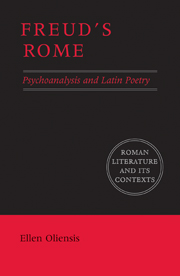Afterword: Freud's Rome
Published online by Cambridge University Press: 05 June 2012
Summary
When Freud's The Interpretation of Dreams first appeared, it bore the symbolically potent publication date of 1900: the new century and the new science were to be born together. The midwife attending that twin birth was none other than Virgil, who supplied Freud with his menacing epigraph: “if I cannot bend the gods above, I will rouse the underworld” (flectere si nequeo superos, Acheronta movebo, Aen. 7.312). A few pages from the end of the book Freud would invoke the same line “to picture the efforts of the repressed instinctual impulses” (as Freud subsequently noted); The Interpretation of Dreams is thus effectively bracketed by Virgil. The Virgilian citation is part of the much larger story of Freud's engagement with Rome, a story that has been well told by others and that I cannot rehearse in full here. My goal is to draw attention to some of its recurring themes, and especially those that bear on the interpretive project of this book. Following Freud's lead, which happily accords with my own inclination, I begin and end with Virgil.
Let me start by noting that the choice of epigraph is surprising, and not only because Freud elected the relatively unglamorous Virgil to this important post, over the heads of the sublime Sophocles and Shakespeare and Goethe. True, the Aeneid was the most continuously canonical of classical texts, and a cornerstone of European education right through the nineteenth century.
- Type
- Chapter
- Information
- Freud's RomePsychoanalysis and Latin Poetry, pp. 127 - 136Publisher: Cambridge University PressPrint publication year: 2009

